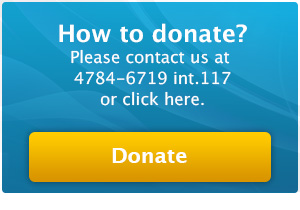
What is Tzedaka?
The jewish sages maintain that the importance of Tzedaka is equivalent to the sum of the rest of the commandments. Within this framework, helping the needy,the unfavoured, has a special denomination in judaism, to do TZAKA. A tzadik is a just, fair man, and tzedaka is to do justice. This is why, in our religion, to help the needy is not considered to be an act of kindness, but an ethical obligation.
The jewish nation, born from an ethical covenant with Divinity, autodefined above all by its moral obligations, must today confront the challenge of striving for a better world, and in that struggle no less than the moral existence of humanity is at stake.
Judaism does not consider poverty to be an unavoidable condition. Wether it will grow or diminish depends on the will of human beings, and the way they organize their societies. Insensitivity towards mankind is a very grave fault. It is not merely a material issue, but it also involves the most profound spiritual implications.
RamBam, Maimônides
"You will open your hand (....) as if to provide for his need of whatever he lacks" (Deut.15.8.) The essence of this precept is that we shall feed the hungry, dress the naked, give a mattress to someone who dos not have one, and a blanket to someone who lacks one. (Book of Precepts).
The eight levels of Tzedaka
The renowned jewish scholar Rambam (Maimonides) explains that one can gradually grow in Tzedaka through eight consecutive levels,in order to reach the highest level of love for our fellow humans. In order to establish the hierarchies of Tzedaka, the Rambam applied the following criteria:
- The degree of willingness to give
- How spontaneously the donation is given
- The degree of anonimity of the giver
- The degree of anonimity of the receiver
- The final destiny of the help
The giving of Tzedaka is a mitzvah through which one acquires merit, hapiness, and spiritual peace. From these we can see that he who helps his neighbour is also helping himself.
The eight levels are as follows:
The highest level of Tzedaka is to help a person to support himself by his own means, before he requires assistance, and before he becomes empoverished. This is accomplished by offering specific help in a dignified way, granting adequate loans, or helping him find employment or set up a business, so that he does not need to depend on others.
In the second level, the giver ignores the identity of the receiver, and viceversa. This form of Tzedaka clearly refers to contributions to funds. Community funds,managed by honourable members, also fall in this category.
In the third level, the donor is aware of the identity of the receiver, but the latter is not aware of the identity of the giver.
The fourth level refers to indirect donations. The receiver is aware of the donor, but not viceversa.
The fifth level deals with cases where help is offered and given to someone who has not asked for it.
The sixth level is to help the needy only when requested to do so. The seventh level is to give help below our means, but in a joyful manner. The eighth and lowelest level, although still legitimate, is to donate unwillingly.
Excerpts of the laws of Tzedaka, extracted from the Kitzur Shuljan Aruj, written by Rabbi Salomon Ganzfned in his book "The Spirit of Jewish Law".
1. It is a positive commandment to give Tzedaka to the poor of Israel, as its ordained: " Undoubtedly you shall open your hand". (Deut. 15.8. ) " You shall not harden your heart to the needy" (Deut.15.7) " It is good that there should not be among you anyone in need". This is the Divine commandement which orders us to banish poverty. (Deut.15.4) "Because there will not cease to be people in need on earth, for this reason I command you: You shall open your hand to your brother generously, that is to the poor and needy in your land" (Deut.15.11)
2. Every person is obliged to give Tzedaka, according to his means, even the poor man who is sustained by Tzedaka, as long as his income is enough for his needs. Even if he can only partake of a small amount, he should not hide this, for its worth is considered as valuable as a rich man's donation. Everybody, even the poorest, have something to give.
Isaias. "Learn to do good, seek for justice, aid the oppressed, respect the rights of the orphans, and defend the widows. "(ISAIAS 1:15 to 17)
Yeshayahu Leibowicz
Poverty does not dissapear spontaneously. In other words, in a regime where poverty and misery exist, these do not dissapear in a spontaneous manner, and one should not expect the intervention of He "who opens his hand and protects with kindness every living creature" (Psalms CLXV:16) Nevertheless, Hashem demands from us to strive to eliminate the poor in our country. (Brief Biblical Reflections, Caracas 1999)
Rabbi Moshe Lev from Sasov
"To love people is to feel their needs,and share their sorrows" (extracted from the compilation of Martin Buber Or Haganuz)
Rabino Leo Baeck
In the jewish language, the word poverty hides a certain religious connotation......it is very significant to note that there is no equivalent for the word beggar in the Hebrew language. The Bible refers to the word "poor" with devotion and respect. It always reminds the jewish people of their own faith, of their own oppression. The sorrow of the poor is also the suffering of the whole nation, the dignity of the poor is its own dignity and its relief is also the people's relief."The poor, the needy, seek for water and dont find it; his tongue is dry by thirst,but Me, Hashem, will listen to their plea. Me, the G-d of Israel, will not forsake them. (Isaiah 41.17) All men are responsible for the needs of every individual member of the community. He who lives in the midst of us must not do so only in the physical sense, but also, as it is so often and significantly maintained, he must live "among" us. Who lives among us has the right to claim from us; when he needs us, we must be by his side; if he is poor, we must help him. (The Essence of Judaism,ob.cit).
Abraham Yoshua Heschel
In my youth, I admired intelligent people. Today, in my old age, I admire kind people. (Jewish wisdom, quoted by Rabbi Joseph Tslushin)
The Lubavitcher Rebbe teaches in his writings: " He who fulfills his duty towards his fellow, proves that he is an able administrator of the goods which Divinity allowed him to posses . Therefore, it is very possible that even greater riches will be placed in his trust.
O Livro dos Preceitos:
"The value of giving to the poor is so great, that our sages have not hesitated in claiming that what the giver does for the poor, the poor does for the giver." By giving, the donor educates himself to become a kind person, to be able to enjoy helping others, and to dominate his egoistic instincts. This will benefit him in all aspects, and will lead him to live a more complete life. In judaism, to give is to educate oneself.
Testimonies:We would like to thank all those who work and collaborate with the Gmaj. We would also like to emphasize the high level of civility and reserve of our staff. All proceedings are conducted in a kind and motivated way. The masejet Pea (Perek Alef) states that Gemilut Hasadim constitutes one of the precepts thanks to which the human being is allowed to benefit from the fruits of this world, while the capital is reserved for the Future World.
May Hashem will to Multiply his Berajot to all of you.


